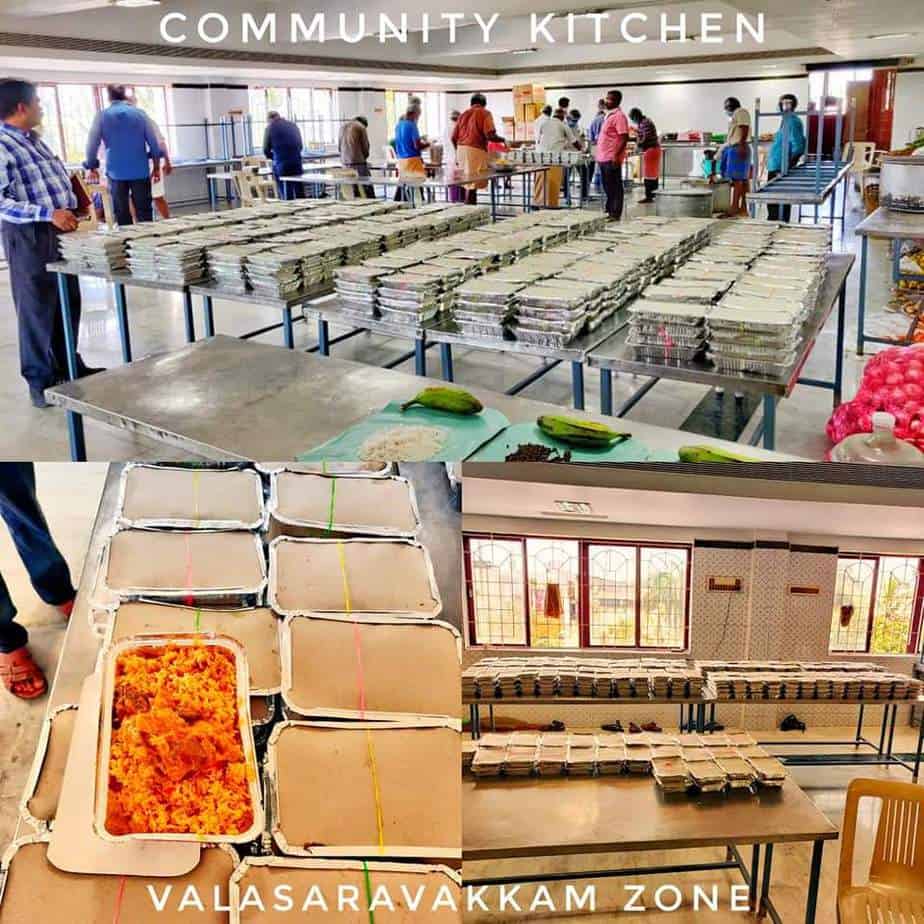On the isolated Rukmani Devi Street of Valasaravakkam, Chinnaiyan, a conservancy worker parks his tricycle under a large almond tree. The shade of the tree has always been his resting place, where he would catch a break after collecting household waste from six streets. As he opens his lunch box, a routine he has been following for a few years now, two residents turn up and ask him not to sit there. “They did not want me to park the tricycle here as they were afraid I would infect them. I will have to eat at the corner of the road from now,” said a low-spirited Chinnaiyan. He wears a mask and gloves provided by Greater Chennai Corporation, but its inferior quality is for anyone to see.
At the suburban Manimangalam Panchayat, blisters cover the hands of a conservancy worker P Govindaraj, who has disinfected the locality with bleaching powder without wearing gloves. He has borrowed a sum of Rs 100 from the local politician for treatment. Now, the moot question is: why did the Panchayat not supply him with the gloves and pay for his medical treatment?
As more and more Chennaiites isolate themselves in the fight against Coronavirus, the plight of these unsung heroes, who work overtime to keep the city habitable, is miserable. Most of the workers continue to report to work every day to clean and disinfect the roads and ensure that our homes do not stink, and in doing so, put their own health at risk every day.
Stepping up to the crisis
After repeated pleas by conservancy workers, the health department of the Greater Chennai Corporation provided gloves and masks for them only around twelve days ago, though the quality is suspect. A mask can be used for barely four hours and the gloves give away in less than a week, say workers. “The masks supplied by the Corporation can be used only for a day. A lot of us have been working without masks for four days now,” said S Purushotaman, General Secretary, Bharathiya Mathur Sangam of Chennai Corporation.
“We were told to wash the gloves every day. But where do we wash? The restrooms in the division office do not have water supply and residents literally shut their doors on us, fearing virus transmission,” said a conservancy worker, wishing to be unnamed. The Coronavirus outbreak has left most residents paranoid about the transmission through the vulnerable groups, which include police officials, doctors and conservancy workers.
The protective gear for conservancy workers (masks and gloves) is also available only to those working in the city, workers in the suburbs do not have them. A senior Corporation official admitted to the shortage of stock and the delay in acquiring the new safety gear. Considering the situation, volunteers across the city are willing to help out the conservancy workers.
“Zonal officers should reach out to the organisations and be transparent about such deficiencies. With volunteerism, such problems can be easily solved,” said Paul Pradeep, founder of an organisation called Tash Troopers. Paul also spoke of the need to use the orange-coloured cut-proof gloves that could last a month with regular cleaning.

A community kitchen at Valasaravakkam, where volunteers cook for conservancy workers everyday. In the community kitchen at Valasaravakkam, a group of like-minded citizens are cooking food for the conservancy workers. Those who are interested can donate groceries by reaching out to Paul Pradeep at +91 98411 66554.
Help them by segregating at source
The non-availability of gloves has temporarily stalled segregation at the Anna Nagar Micro Composting Centre (MCC). Even though the Tamil Nadu State Transport Corporation (TNSTC) is operating 100 buses to help conservancy workers commute, there are some absentees for multiple reasons. “More than 10 per cent of the workers do not report to work every day, mostly due to corona scare. Workers in the MCCs are strictly refusing to take up the segregation work without protective masks,” explained Purushotaman.
The situation only indicates that segregation is taking a hit in the MCCs of Chennai. Well, here is an alternative solution. “Now that citizens have ample time, why not use it to segregate the waste at source?” asks Paul, as he also points to the risk to the workers through used masks. Every ward receives a large number of masks mixed with the household waste, disposed of in an unhygienic manner. “These used masks could well infect the conservancy workers if they have to segregate them from the mixed waste, hence citizens should wrap them in a paper and mark it with a red dot,” says Paul.
The next step for those who segregate could be to process the food waste at home, he suggests.
There are many workers like Govinda Raj who work for salaries as meagre as Rs 5000/month and for whom medical insurance is a far cry. Residents of Zone 13 have now started a fundraising campaign to help these conservancy workers financially. Donations for them can be made here: https://milaap.org/fundraisers/support-conservancy-workers.